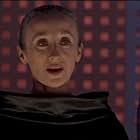Sanguinarium
- Episode aired Nov 10, 1996
- TV-14
- 44m
IMDb RATING
7.3/10
4.3K
YOUR RATING
Patients undergoing cosmetic surgery die horrible deaths at the hands of doctors possessed by witchcraft.Patients undergoing cosmetic surgery die horrible deaths at the hands of doctors possessed by witchcraft.Patients undergoing cosmetic surgery die horrible deaths at the hands of doctors possessed by witchcraft.
Greg Thirloway
- Dr. Mitchell Kaplan
- (as Gregory Thirloway)
Leanne Adachi
- ER Nurse #2
- (uncredited)
Constance Barnes
- Nurse
- (uncredited)
Erin Jeffery
- ER Nurse
- (uncredited)
Nancy J. Lilley
- Liposuction Patient
- (uncredited)
Celine Lockhart
- The Skin-Peel Patient
- (uncredited)
Kevin McCrae
- ER Surgeon
- (uncredited)
Featured reviews
Yet again a greats story with scully being a doubter and only believing in the science. This a great show because the reality is that your life is in their hands and all for the price of beauty. Moulder once again gets out his foil hat and delves deep into the world of witchcraft looking for the clues, that started behind door number 3. I think the most frustrating part of a review is that IMDB want you to plant 600 words when sometimes less is more, but sadly there is not too much we can do about that is there????????. Brilliant show watching for the 50th time, it ever gets old. Big thumbs up from me.
The sixth episode of the fourth season of The X-Files, titled "Sanguinarium," directed by Jim Bowman, delves into the grotesque world of cosmetic surgery intertwined with supernatural elements. The episode begins with a chilling scene in a plastic surgery clinic where a doctor performs a botched liposuction, resulting in the death of a patient. This gruesome opening sets the tone for an episode that explores themes of vanity, obsession, and the darker side of human nature. As Mulder (David Duchovny) and Scully (Gillian Anderson) investigate the unsettling occurrences at the clinic, they uncover a series of bizarre murders linked to a malevolent force that seems to be manipulating the doctors involved.
The pacing of "Sanguinarium" is brisk, effectively maintaining tension as Mulder and Scully navigate through a labyrinth of clues that lead them deeper into the clinic's dark secrets. The narrative cleverly intertwines elements of horror with social commentary on society's obsession with beauty and perfection. One particularly striking scene occurs when Mulder discovers a pentagram burned into the operating room floor, suggesting that witchcraft may be at play. This revelation adds an intriguing layer to the story, prompting viewers to question whether the true horror lies in supernatural forces or in the characters' own moral failings.
Visually, "Sanguinarium" employs a dark and unsettling aesthetic that enhances its themes of dread and decay. Bowman's direction effectively captures both the sterile environment of the clinic and the emotional turmoil experienced by Mulder and Scully as they confront their own fears about body image and mortality. The cinematography utilizes sharp contrasts between light and shadow to evoke feelings of unease, particularly during scenes where characters are confronted with their own imperfections. Critics have noted that this visual storytelling immerses viewers in a world where beauty is both alluring and horrifying.
The performances in this episode are noteworthy, particularly from Paul Raskin as Dr. Ilaqua, whose character embodies both charm and menace. Raskin's portrayal adds depth to the narrative, making him a compelling figure whose motivations remain ambiguous throughout the episode. Duchovny delivers a strong performance as Mulder, showcasing his determination to uncover the truth while grappling with societal pressures regarding appearance. Anderson's Scully provides a rational counterbalance; her skepticism grounds Mulder's theories while emphasizing her concern for his well-being. The chemistry between Duchovny and Anderson continues to shine, adding emotional weight to their partnership.
Thematically, "Sanguinarium" raises significant questions about identity, morality, and societal standards of beauty. The episode critiques how individuals can become consumed by their desires for perfection; it examines how obsession with physical appearance can lead to destructive behaviors. Additionally, it highlights societal attitudes toward cosmetic surgery; characters like Dr. Ilaqua represent those who exploit vulnerabilities for profit. This exploration invites viewers to reflect on their beliefs regarding beauty, self-worth, and the ethical implications of surgical enhancement.
"Sanguinarium" stands out as a provocative entry in The X-Files, successfully blending elements of horror with social commentary while exploring complex themes related to vanity and morality. While it may not resonate with all viewers due to its graphic content and unsettling subject matter, it effectively maintains tension and intrigue throughout its runtime. The exploration of these themes within a modern context encourages viewers to consider their perceptions of beauty and self-identity in society, solidifying The X-Files as a thought-provoking examination of human experience amidst extraordinary phenomena. As it reflects broader societal concerns regarding obsession with appearance and ethical dilemmas in medicine, "Sanguinarium" leaves audiences contemplating their own relationships with beauty and self-acceptance.
The pacing of "Sanguinarium" is brisk, effectively maintaining tension as Mulder and Scully navigate through a labyrinth of clues that lead them deeper into the clinic's dark secrets. The narrative cleverly intertwines elements of horror with social commentary on society's obsession with beauty and perfection. One particularly striking scene occurs when Mulder discovers a pentagram burned into the operating room floor, suggesting that witchcraft may be at play. This revelation adds an intriguing layer to the story, prompting viewers to question whether the true horror lies in supernatural forces or in the characters' own moral failings.
Visually, "Sanguinarium" employs a dark and unsettling aesthetic that enhances its themes of dread and decay. Bowman's direction effectively captures both the sterile environment of the clinic and the emotional turmoil experienced by Mulder and Scully as they confront their own fears about body image and mortality. The cinematography utilizes sharp contrasts between light and shadow to evoke feelings of unease, particularly during scenes where characters are confronted with their own imperfections. Critics have noted that this visual storytelling immerses viewers in a world where beauty is both alluring and horrifying.
The performances in this episode are noteworthy, particularly from Paul Raskin as Dr. Ilaqua, whose character embodies both charm and menace. Raskin's portrayal adds depth to the narrative, making him a compelling figure whose motivations remain ambiguous throughout the episode. Duchovny delivers a strong performance as Mulder, showcasing his determination to uncover the truth while grappling with societal pressures regarding appearance. Anderson's Scully provides a rational counterbalance; her skepticism grounds Mulder's theories while emphasizing her concern for his well-being. The chemistry between Duchovny and Anderson continues to shine, adding emotional weight to their partnership.
Thematically, "Sanguinarium" raises significant questions about identity, morality, and societal standards of beauty. The episode critiques how individuals can become consumed by their desires for perfection; it examines how obsession with physical appearance can lead to destructive behaviors. Additionally, it highlights societal attitudes toward cosmetic surgery; characters like Dr. Ilaqua represent those who exploit vulnerabilities for profit. This exploration invites viewers to reflect on their beliefs regarding beauty, self-worth, and the ethical implications of surgical enhancement.
"Sanguinarium" stands out as a provocative entry in The X-Files, successfully blending elements of horror with social commentary while exploring complex themes related to vanity and morality. While it may not resonate with all viewers due to its graphic content and unsettling subject matter, it effectively maintains tension and intrigue throughout its runtime. The exploration of these themes within a modern context encourages viewers to consider their perceptions of beauty and self-identity in society, solidifying The X-Files as a thought-provoking examination of human experience amidst extraordinary phenomena. As it reflects broader societal concerns regarding obsession with appearance and ethical dilemmas in medicine, "Sanguinarium" leaves audiences contemplating their own relationships with beauty and self-acceptance.
One of the show's most disturbing episodes for the most part but the rest is ridiculous. I have always kind of enjoyed it even though I'm completely aware of how messy and illogical it gets. We have a great performance from the always-brilliant Richard Beymer. This one fits in perfectly with the rest of Season Four's dark uncanniness but gun to my head, this is Season Four's worst episode. It's incredibly tedious and awful but somehow, just somehow, you find yourself enjoying just how awful it gets. In retrospect, it's essentially a so bad it's genius episode as it looks into plastic surgeons being possessed by witchcraft but its execution isn't all too swell.
10XweAponX
Despite Gillian Anderson's complaints about the gore factor of this episode, it is one of the best.
You just have to slide and give yourself a little bit of belief suspension... before you ingest any milk of magnesia, or other upset stomach suspension fluid.
"What comes out generally has to go in"
This also shines a light on the entire cosmetic surgery profession. We have seen results of cosmetic surgery in real life, with real people that we know about, where it has backfired spectacularly. There is a point where something that is beneficial when done frugally becomes detrimental when performed unnecessarily and repeatedly. And so it is relatively appropriate to take a documentary style episode about this kind of surgical addiction and stick it into the X-Files as horror- because ultimately, what people do to each other, or actually what they have their doctors do to them, can be more frightening than anything that we have ever seen done by Freddy Kruger.
Because how many "kidney" operations do you really need?
I could not figure out what was actually going on until they reveal it with utter finally. And reveal it they did, just like in the film 'beneath the planet of the apes', where they chant: "let us reveal our inner selves to our God".
I won't get into too much detail, but something very similar to what happens in that scene from that movie, happens in this episode.
And we are chasing the wrong bad guy when this episode starts. We are totally focused upon one person, but when you go back and watch the episode again you realize, that person really did not do anything to merit being scrutinized as the bad guy. Or bad woman. But we were tricked, beautifully and cleverly tricked.
By Richard Beymer from West Side Story nonetheless! Whoda Thunk?
You just have to slide and give yourself a little bit of belief suspension... before you ingest any milk of magnesia, or other upset stomach suspension fluid.
"What comes out generally has to go in"
This also shines a light on the entire cosmetic surgery profession. We have seen results of cosmetic surgery in real life, with real people that we know about, where it has backfired spectacularly. There is a point where something that is beneficial when done frugally becomes detrimental when performed unnecessarily and repeatedly. And so it is relatively appropriate to take a documentary style episode about this kind of surgical addiction and stick it into the X-Files as horror- because ultimately, what people do to each other, or actually what they have their doctors do to them, can be more frightening than anything that we have ever seen done by Freddy Kruger.
Because how many "kidney" operations do you really need?
I could not figure out what was actually going on until they reveal it with utter finally. And reveal it they did, just like in the film 'beneath the planet of the apes', where they chant: "let us reveal our inner selves to our God".
I won't get into too much detail, but something very similar to what happens in that scene from that movie, happens in this episode.
And we are chasing the wrong bad guy when this episode starts. We are totally focused upon one person, but when you go back and watch the episode again you realize, that person really did not do anything to merit being scrutinized as the bad guy. Or bad woman. But we were tricked, beautifully and cleverly tricked.
By Richard Beymer from West Side Story nonetheless! Whoda Thunk?
I'm a fan of the X Files, I started following it at Season 7 in its airtime and followed it to the very end. In 2007 I rented all the seasons one by one and watched every episode. Of all the episodes, this is the most disturbing one I've ever seen.
Basically this is an episode about a hospital where plastic surgery goes horribly wrong. It begins with a kick to the teeth- the epic "liposuction" scene. Lots of gross stuff happens- A man cuts off his own face, a woman pukes up needles, etc. I love gore, but hell, this episode disturbed me in every way possible! In short, I never get disturbed, but this episode was extremely disturbing. I probably wouldn't watch it again because of how gross and disturbing it was. But it is a worthy episode in the series and worth watching at least once.
Basically this is an episode about a hospital where plastic surgery goes horribly wrong. It begins with a kick to the teeth- the epic "liposuction" scene. Lots of gross stuff happens- A man cuts off his own face, a woman pukes up needles, etc. I love gore, but hell, this episode disturbed me in every way possible! In short, I never get disturbed, but this episode was extremely disturbing. I probably wouldn't watch it again because of how gross and disturbing it was. But it is a worthy episode in the series and worth watching at least once.
Storyline
Did you know
- TriviaThe pentagram is obvious in some scenes and not so obvious in others. Production designer Graeme Murray created rooms with five sides and had the plastic surgery unit with five operating rooms represent an imaginary pentagram.
- GoofsMulder pronounces the the name of Gaelic holiday of Samhain as "sam-hayne," like it's spelled in the Roman alphabet. The correct pronunciation is "sah-win."
- Quotes
Dana Scully: There's magic going on here, Mulder. Only it's being done with silicone, collagen, and a well-placed scalpel.
- ConnectionsFeatured in WatchMojo: Top 10 Horrifying X-Files Moments (2018)
Details
- Release date
- Country of origin
- Official sites
- Language
- Filming locations
- Production companies
- See more company credits at IMDbPro
Contribute to this page
Suggest an edit or add missing content

















